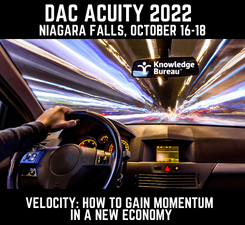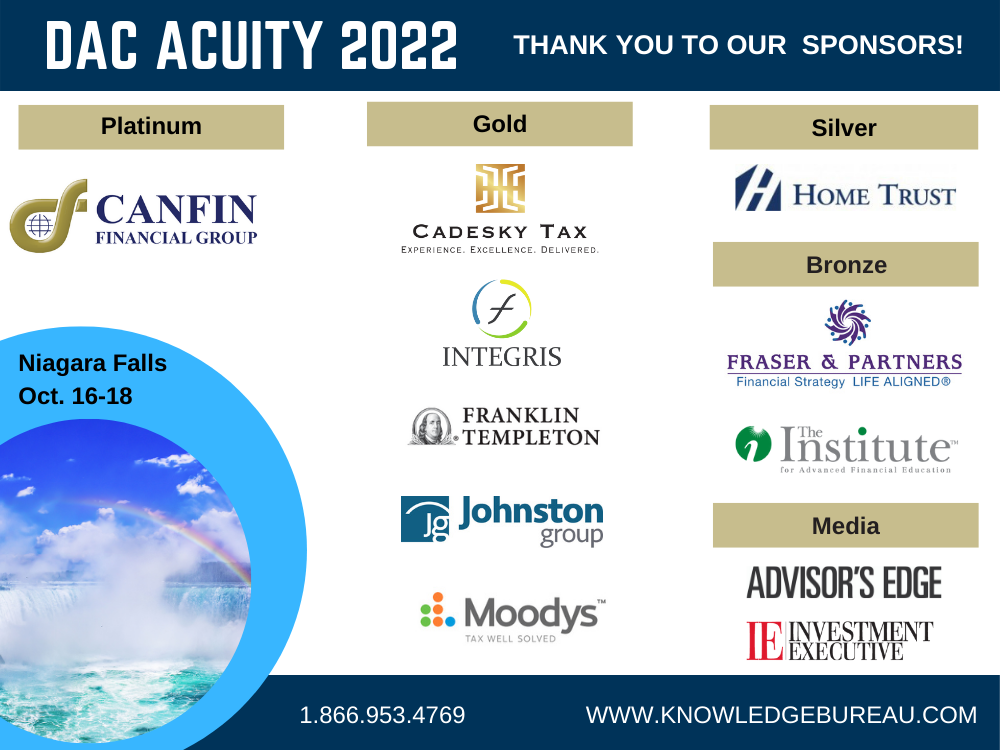Last updated: June 08 2022
Climate Grief & Its Effect on Estate Planning with Generation Dread

Estate planning discussions are always difficult, but these days, perhaps even more so. That’s why tax and financial services providers must pay attention to new trends; notably, that young people – who are to be engaged as the primary stakeholders in wealth transfers – have experienced a significant drop in hopefulness. A recent Statistics Canada study concludes that future research could be done to better understand the potential implications. But DAC Keynote Speaker and new author Dr. Brett Wray has done some important research of her own and has a critical, urgent message: intergenerational power and wealth will not fix the underlying malaise. Find out more, below; reserve your spot at DAC now.
In difficult times, measures of wellbeing are increasingly connected to factors other than money, including mental health, loneliness and sense of belonging to local communities. According to Statistics Canada, young people have experienced a significant drop in hopefulness (15%) since the start of the pandemic. That has brought with it both good and bad news for estate planning discussions.
First, the good news: Canadians who lived in multiple-person households with children were more hopeful that those without children or living alone. Who had the highest level of  hopefulness? Those on maternity, paternity or parental leave (83%). A sense of belonging also makes a big difference. These clients are generally in a good place to discuss estate planning.
hopefulness? Those on maternity, paternity or parental leave (83%). A sense of belonging also makes a big difference. These clients are generally in a good place to discuss estate planning.
Conversely, the existential threat of climate change, entangled with under- or unemployment and financial insecurity have profound effects on hopefulness, and therefore quality of life and the ability to plan for the future.
In her riveting session, ESTATE PLANNING WITH GENERATION DREAD: Finding Financial Peace of Mind Through the Emotional Despair of Climate Change, Dr. Wray will discuss these issues and ask you to consider:
- Your ideal client for estate planning discussions may have changed.
- In their mindset, young people who must embrace estate planning as powers of attorney, decision-makers in living wills and executors, feel a “deep moral injury” about institutional and generational “betrayal” about attitudes towards the enormous existential threat they face in their future.
- For these heirs, wealth transfer discussions only add to the significant distress they feel. Estate planning discussions, in the traditional sense, therefore could be a non-starter. Find out what is required to engage them.
Dr. Britt Wray is well equipped to explain why understanding this mindset matters so much in the work you do. Dr. Wray has a PhD in Science Communication from the University of Copenhagen and is a journalist, speaker, and author of two books: Generation Dread: Finding Purpose in the Climate Crisis (Knopf 2022) and Rise of the Necrofauna: The Science, Ethics and Risks of De-Extinction (Greystone Books 2017).
She has hosted and produced several science radio programs, podcasts and television programs for international broadcasters including the BBC and CBC, and is a TED speaker. A Human and Planetary Health Postdoctoral Fellow at the Stanford Center for Innovation in Global Health, Stanford Woods Institute for the Environment and London School of Hygiene & Tropical Medicine, her research focuses on the mental health impacts of climate change on 'emerging adults' and frontline community members, socio-emotional resilience and public engagement for improved mental wellbeing and planetary health.
Bottom Line: You won’t want to miss this session, live and in person, in Niagara Falls, October 16 – 18. Reserve your spot now, first come, first served.
Enrol now https://www.knowledgebureau.com/site/conference/dac
Sponsor image
The Agenda. Of course, you don’t just come to DAC for the networking, there is the serious work of understanding the trends that lead to sound decision-making with your clients in the current environment. Here are some highlights from this year’s educational agenda.
On the Full Agenda:
- Velocity: The Speed of Change and Its Effects on Your Work
- Ethical Behaviors: Breaking Down the Duties of Care
- The Velocity of Money: The Rate of Spending and Its Impact on Investors
- Coming Home: The Tax Quagmire for Ex-Pats
- Team Building: Lunch at the Improv
- New Money Demographics: Integrating Digital Currency in Investment Conversations
- Hedging Risk: How to Manage Volatility to an Investor’s Advantage
- Investor Behavior: Managing Fear of Missing Out
- Truth & Reconciliation
- Rethinking Wealth Advisor Services
- Help Wanted: Transformative Leadership for Canada
- The Speed of Tax Change: What it Means for You and Your Clients
- New Trends in Group Benefits
- How to Get More Distance from Your Pension Plan
- Planning for Disability: A Multi-Advisory Case Study
- Doing Good: Why Making a Social Impact Matters to Your Next Client
- Velocity: The Need for Speed to Succeed
Learn more about the speakers who will be delivering these informative and inspiring sessions as we feature them in upcoming editions of Knowledge Bureau Report.
Visit the DAC page often for updates to this comprehensive agenda!

